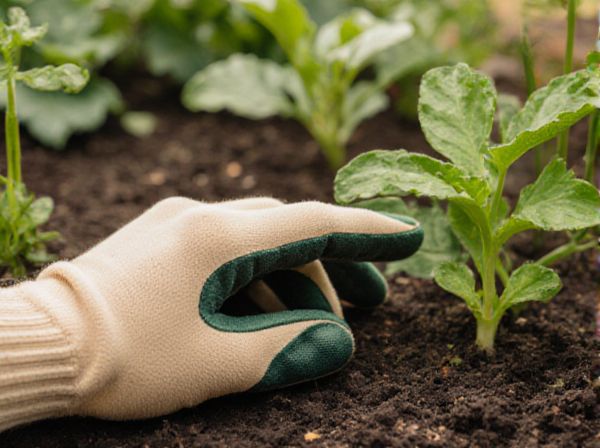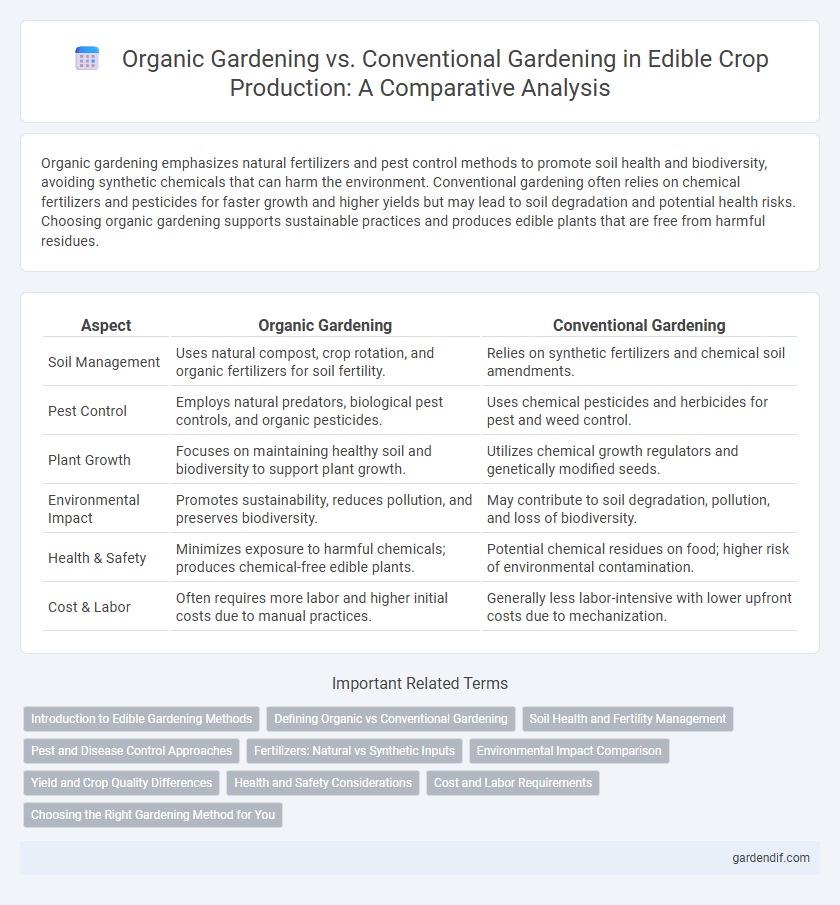
Organic gardening vs Conventional gardening Illustration
Organic gardening emphasizes natural fertilizers and pest control methods to promote soil health and biodiversity, avoiding synthetic chemicals that can harm the environment. Conventional gardening often relies on chemical fertilizers and pesticides for faster growth and higher yields but may lead to soil degradation and potential health risks. Choosing organic gardening supports sustainable practices and produces edible plants that are free from harmful residues.
Table of Comparison
| Aspect | Organic Gardening | Conventional Gardening |
|---|---|---|
| Soil Management | Uses natural compost, crop rotation, and organic fertilizers for soil fertility. | Relies on synthetic fertilizers and chemical soil amendments. |
| Pest Control | Employs natural predators, biological pest controls, and organic pesticides. | Uses chemical pesticides and herbicides for pest and weed control. |
| Plant Growth | Focuses on maintaining healthy soil and biodiversity to support plant growth. | Utilizes chemical growth regulators and genetically modified seeds. |
| Environmental Impact | Promotes sustainability, reduces pollution, and preserves biodiversity. | May contribute to soil degradation, pollution, and loss of biodiversity. |
| Health & Safety | Minimizes exposure to harmful chemicals; produces chemical-free edible plants. | Potential chemical residues on food; higher risk of environmental contamination. |
| Cost & Labor | Often requires more labor and higher initial costs due to manual practices. | Generally less labor-intensive with lower upfront costs due to mechanization. |
Introduction to Edible Gardening Methods
Organic gardening emphasizes natural techniques such as composting, crop rotation, and biological pest control to cultivate edible plants without synthetic chemicals. Conventional gardening often relies on chemical fertilizers, pesticides, and genetically modified seeds to maximize crop yield. Both methods aim to produce healthy, nutrient-rich vegetables and fruits, but organic gardening prioritizes environmental sustainability and soil health.
Defining Organic vs Conventional Gardening
Organic gardening emphasizes natural fertilizers, pest control methods, and soil health, avoiding synthetic chemicals to promote ecological balance and biodiversity. Conventional gardening relies on synthetic fertilizers, pesticides, and herbicides to enhance plant growth and control pests, often prioritizing higher yields and faster production. Both methods impact soil quality, plant health, and environmental sustainability differently, shaping their effectiveness and ecological footprint.
Soil Health and Fertility Management
Organic gardening emphasizes maintaining soil health through natural composting, crop rotation, and the use of cover crops, which enhance microbial activity and nutrient cycling. Conventional gardening often relies on synthetic fertilizers and pesticides that can disrupt soil ecosystems and reduce long-term fertility. Sustainable soil fertility management in organic systems supports improved soil structure, water retention, and biodiversity compared to conventional methods.
Pest and Disease Control Approaches
Organic gardening relies on natural pest control methods such as introducing beneficial insects, crop rotation, and using organic pesticides derived from plant or mineral extracts. Conventional gardening often employs synthetic chemical pesticides and herbicides to manage pests and diseases, offering faster and more targeted results but with potential environmental and health risks. Effective pest and disease control in organic gardening emphasizes maintaining ecosystem balance and soil health to enhance plant resilience.
Fertilizers: Natural vs Synthetic Inputs
Organic gardening relies on natural fertilizers such as compost, manure, and bone meal to enrich the soil, promoting healthy microbial activity and sustainable nutrient cycling. Conventional gardening typically uses synthetic fertilizers, which provide readily available nutrients but can lead to soil degradation and chemical runoff over time. Natural fertilizers improve soil structure and long-term fertility, while synthetic inputs offer quick nutrient boosts but may harm the ecosystem if overused.
Environmental Impact Comparison
Organic gardening reduces environmental impact by eliminating synthetic pesticides and fertilizers, thereby enhancing soil health and promoting biodiversity. Conventional gardening often relies on chemical inputs that can lead to soil degradation, water contamination, and harm to beneficial organisms. Studies show organic methods increase carbon sequestration and support pollinator populations, making them more sustainable for ecosystem balance.
Yield and Crop Quality Differences
Organic gardening often produces lower yields compared to conventional gardening due to the absence of synthetic fertilizers and pesticides, which enhance plant growth and pest control. However, crops grown organically tend to have higher nutrient density and better flavor profiles, attributed to natural soil enrichment and reduced chemical exposure. Conventional gardening typically delivers higher quantity but may compromise on nutritional quality and taste due to chemical inputs.
Health and Safety Considerations
Organic gardening minimizes exposure to synthetic pesticides and fertilizers, significantly reducing health risks such as respiratory issues and skin irritations. Conventional gardening often relies on chemical inputs that can contaminate soil and water, posing long-term safety concerns for both gardeners and consumers. Choosing organic methods promotes safer food production and supports overall environmental health.
Cost and Labor Requirements
Organic gardening often requires higher initial investment due to the need for organic seeds, natural fertilizers, and pest control methods, which can lead to increased costs compared to conventional gardening. Labor requirements tend to be more intensive in organic gardening because of practices like manual weeding and composting, whereas conventional gardening frequently uses chemical aids that reduce physical effort. Despite higher labor input, organic gardening can offer long-term savings and environmental benefits by improving soil health and reducing chemical dependency.
Choosing the Right Gardening Method for You
Organic gardening emphasizes using natural fertilizers and pest control methods to promote sustainable soil health and biodiversity, while conventional gardening often relies on synthetic chemicals for faster plant growth and pest management. Choosing the right gardening method depends on factors such as environmental impact, crop yield goals, and personal health preferences. Evaluating soil quality, resource availability, and long-term sustainability helps gardeners make informed decisions aligned with their values and gardening objectives.
Organic gardening vs Conventional gardening Infographic

 gardendif.com
gardendif.com